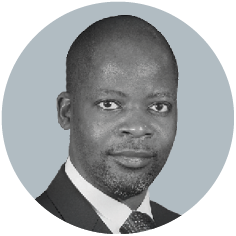German policymaking
The BMZ seems stuck in a European mindset
 picture-alliance/imageBROKER/FLPA/Wayne Hutchinson
picture-alliance/imageBROKER/FLPA/Wayne Hutchinson
The BMZ strategy should have prioritised a partnership model that enables Africa to do away with the constraints that block prosperity. Most were caused by European powers. The African market is fragmented, and inadequate supply chains date back to the colonial era. Investments in indigenous African food systems have long been neglected, while European exports of subsidised agricultural goods crowded out local farmers. It fits the picture that African markets are flooded with foreign-made consumer goods.
The BMZ strategy fails to assess what has gone wrong in Europe’s relationship with Africa. European powers have shaped life in most African countries for more than a century, maintaining a strong influence after independence. Nonetheless, trade with China has fast overtaken trade with Africa in recent decades. According to the BMZ, the EU is exporting almost twice as much to China as it does to Africa, and importing almost four times more from China.
The BMZ strategy neither makes precise statements on how many miles of road and rail nor on how many seaports and airports Germany intends to build. It is full of ideas regarding how Africa could become more attractive in European eyes, but says nothing about how German attitudes must change – regarding, for example, investing in Africa and managing related risks.
New protectionism of USA and EU
Africans face a huge dilemma today. We see the high-income nations that used to be citadels of free-market rhetoric retreat into protectionism. The USA and the EU are adopting industrial policies with little respect for the market-orthodox ideology that they preached for decades. Structural adjustment programmes in the 1980s were supposed to make African economies competitive, but that liberalisation drive did not trigger major productivity gains and prosperity. It opened African markets to multinational interests, but African economies still depend on commodity exports.
Africans know two things: Europe needs skilled immigrants, but also wants to keep refugees away. The BMZ strategy does not state what it is supposed to achieve in either regard. How rigidly are African governments expected to close their national borders for Germany’s sake? And to what extent does Germany hope to poach professionals and skilled workers from Africa? In the mind of sub-Saharan readers, that desire explains a large part of the BMZ’s focus on education and vocational training.
The strategy promises to support democracy and human rights, and even to monitor their state in Africa. This arrogant approach is not backed up with proposals regarding how to deal with the challenges democracy is facing internationally.
Manipulation of the public sphere
Insisting on a democratic process does not prevent financial capture by the wealthy. Psychological manipulation abounds in the public sphere. All over the world, voters often wonder whether they were misled by digitised information. Just consider that a majority of British voters now regret Brexit.
In close cooperation, German and African institutions should explore what to do about the algorithms that organise public discourse for users of social media and search engines. These algorithms have contributed to rendering democracy into a fiction.
Instead of rising to challenges like this, the BMZ strategy promises to monitor Africa. Well, the greatest problem – not only in Africa – is that voters too rarely see good political and economic results, no matter who they elect.
The World is changing. Nationalism is rising, and the big power competition between the USA and China is polarising the global arena. Western countries, so far, have failed to convince a substantial number of governments of their narrative in the Ukraine war.
Europe needs Africa to be a close partner. The big questions are: what is Europe offering, and how does it expect to regain lost trust? The BMZ strategy does not provide satisfying answers.
You'll find the BMZ's response here:
Link
BMZ, 2023: Shaping the future with Africa. The Africa strategy of the BMZ. (Also available in French.)
https://www.bmz.de/resource/blob/137602/bmz-afrika-strategie-en.pdf
James Shikwati is the founder-director of the Inter Region Economic Network, a Kenyan think tank.
james@irenkenya.com





